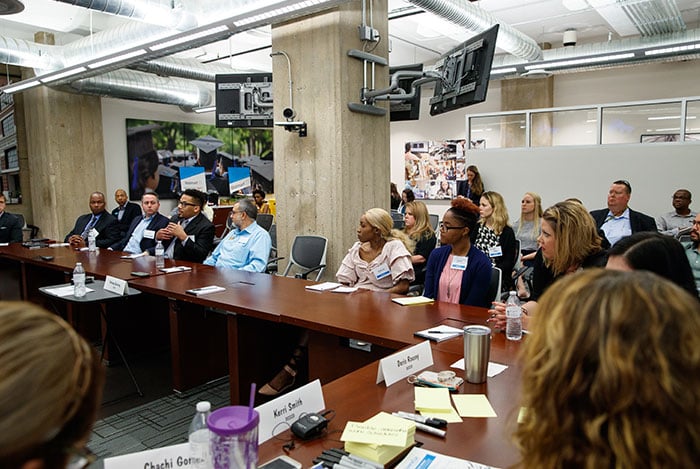Generation Partners with DCCCD in Dallas to tackle turnover for managers and supervisors

Generation and DCCCD convened a group of Dallas leaders and business partners to discuss reducing turnover and bolstering retention among young adults in the workplace.
Generation convened a group of community and business leaders to discuss turnover and retention among youth in retail and customer service jobs on May 22 at the Dallas County Community College District (DCCCD) Convening Center. The event, connecting retail and customer service employers and local community organizations, discussed how to retain and support high-performing employees in the retail sector and how to create a network that utilizes industry and community partners to engage young adults and increase retention in the workforce. Generation works with 1900 plus employer partners worldwide and a wide range of implementation partners and funders.
According to a survey by the Center for Popular Democracy, of 1,100 retail front-line employees, 47 percent of the surveyed employees are part-time. Many of the employees in this study were involuntary part-time workers—meaning they desired full-time hours but could only find part-time work. In fact, 45 percent of the employees on staff wanted an increase in hours reported by one employer in the study. 31 percent of employees worked more than one job. Furthermore, 25 percent reported having economic hardships to due to their part-time income.
“The tackling turnover event was a great opportunity to get perspectives from employees young adults, community partners, and employers. Everyone was transparent and ready to engage beyond today’s event to do the work of solving the retention problem,“ said Generation Dallas Program Coordinator, Demetra Brown.
The panelists at the event represented a variety of industries and companies in Dallas such as Alberstons, the Hilton Garden Inn, McKinsey & Company, the Dallas County District Attorney’s Office and the DCCCD’s Workforce and Economic Development office.
“Employees see no pathway for upward mobility,” said Generation program mentor and panelist, Joshua Boyce.
“People don’t leave bad companies, they leave bad management,” said Kimberly J. Duran, program clinician at the Dallas County district attorney’s office. “Identify those individuals with great skills and allow them to help mentor all employees; creating a culture of good, positive, energy,” she said.

Participants at the workshop participated in a unique style of problem-solving called compression planning. Compression planning uses a form of collaboration to help leaders leverage collaborative time and make better decisions faster through storyboarding techniques.
“It has a start, it has a stop and it tells a story. It’s [compression planning] a way to identify specific issues and rapidly explore ideas and solutions to those issues,” said Anthony Denning, senior director of operations and strategic initiatives at the DCCCD Convening Center.
In a study conducted by FSG in 2016, the U.S. retail sector lost $9 billion due to entry-level voluntary turnover. One of the strategies FSG presented is investing in people-centered management. A study on frontline managers and flexibility practices by Drs. Susan Lambert and Julia Henly at the University of Chicago stated that “stores where frontline managers took employee scheduling preferences into account had a 23 percent lower turnover and 7 percent higher retention than stores where frontline managers did not.”
In an effort to aid frontline managers and workers, Generation will be offering a series of workforce development discussions around people-centered management and other management strategies beginning in fall 2018 in partnership with the DCCCD Convening Center. Made possible by a grant from Walmart, the series and Generation’s Retail Career Advancement program aims to connect employers and organizations in Dallas to accelerate mobility in retail: generating insights into retail as a sector of opportunity, building effective approaches to retail training and advancement and engaging retail employers to improve the workforce development system.
In total, more than 18,000 young adults have graduated from the Generation program, which prepares young adults for careers in 65 cities and 155 sites across 8 countries. Globally, 88% of Generation graduates are outperforming their peers. 98% of employers say they would hire Generation graduates again.







